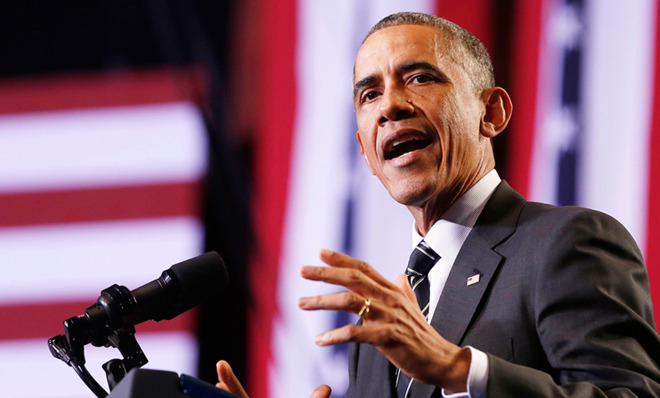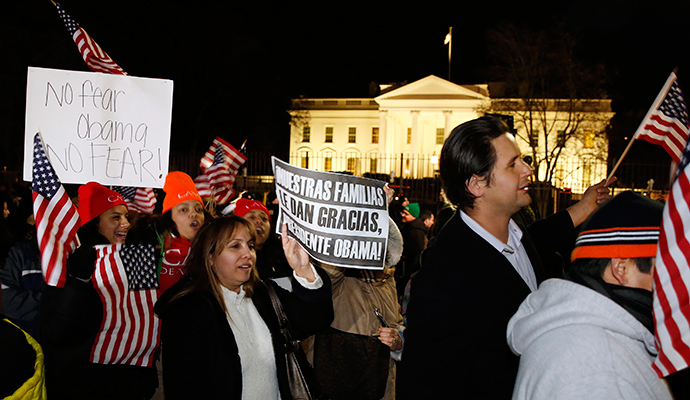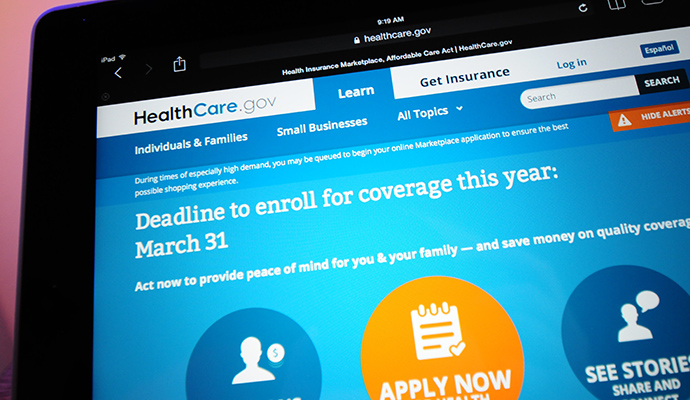What to watch for in Washington in 2015
Republicans on the offensive, a Tea Party of the left, and an end to the 2016 waiting game


A free daily email with the biggest news stories of the day – and the best features from TheWeek.com
You are now subscribed
Your newsletter sign-up was successful
Congress is putting a bow on one of the least productive legislative sessions in history. And with President Obama looking like a lame duck with two years left in office, 2015 may seem destined to be a rather uneventful year in Washington.
Not so.
Having seized control of both chambers of Congress, Republicans are raring to finally set the agenda and prove they can govern. And with the elections in the rearview mirror, presidential aspirants can finally stop being so coy about their intentions and get to work tearing each other down.
The Week
Escape your echo chamber. Get the facts behind the news, plus analysis from multiple perspectives.

Sign up for The Week's Free Newsletters
From our morning news briefing to a weekly Good News Newsletter, get the best of The Week delivered directly to your inbox.
From our morning news briefing to a weekly Good News Newsletter, get the best of The Week delivered directly to your inbox.
So here, seven things to watch for in Washington next year.
1. 2016 mayhem
The first presidential primary is still a year away. No one has officially announced they're running. Yet 2015 is going to be all about 2016.
With a speaking schedule booked through March, Hillary Clinton is rumored to be eyeing a spring announcement. Her potential Democratic opponents, former Sen. Jim Webb (D-Va.) formed a presidential exploratory committee in November and says he will make an announcement soon. Departing Maryland Gov. Martin O'Malley says he will "probably" know whether he's running by late January.
A free daily email with the biggest news stories of the day – and the best features from TheWeek.com
On the GOP side, ex-Florida Gov. Jeb Bush said last month that he is "actively exploring" a run. Meanwhile, New Jersey Gov. Chris Christie and Sen. Rand Paul (R-Ky.) have both said they'll decide early this year. No word yet from other probable GOP contenders like Sen. Ted Cruz (R-Texas) or Wisconsin Gov. Scott Walker, but you can expect them to follow a similar schedule.
By the late spring, the 2016 primary field should become fairly clear. Once the first debates take place — perhaps as early as June, if history is a guide — the races for the party nominations will really begin in earnest.
The GOP contest looks historically open — expect the fighting to turn nasty fast and the polls to swing back and forth. On the Democratic side, Hillary will try to definitively trounce challengers aiming to replicate Obama's success in laying the groundwork in the fall of 2007 for his upset victory the following year.
We know only a few things about how it will look in the fall: There will be gaffes. There will be Obama hating. There will be comically inept dark-horses. And if the past two presidential cycles were any indication, there's going to be lots and lots of craziness.
2. The GOP leadership gets to lead
The divided Congress failed to accomplish much of anything over the past few years. But with Republicans grabbing control of the Senate for the first time since 2006, incoming Majority Leader Mitch McConnell (R-Ky.) and House Speaker John Boehner (R-Ohio) will have complete control over Congress' agenda.
That power won't come without its challenges, as Republicans will have to carefully placate their conservative base without jilting everyone else. For instance, blessed with a GOP Senate, House Republicans plan to introduce a budget modeled on previous plans proposed by outgoing budget chair Rep. Paul Ryan (R-Wis.). Yet those blueprints called for overhauling Medicare and gutting Medicaid, which could prove deeply unpopular and swiftly erode the GOP's standing.
The GOP leadership will also have to contend with a Tea Party wing whose antagonism toward the establishment hasn't dwindled despite resounding defeats in primary challenges last year. As December's funding fight showed, Sen. Ted Cruz does not plan to pipe down and play nice with the rest of his caucus — even if that means inadvertently aiding Democrats.

3. Republicans go on the offensive
For all their talk about reaching across the aisle and ensuring Washington gets stuff done, the incoming GOP leadership has also made clear it plans to take a hatchet to Obama's agenda.
House Republicans plan to vote in January on a measure prohibiting the president from carrying out his executive action on immigration, though it's unclear whether they'll have the votes to do so. More substantively, the last-minute spending bill Congress passed in December only funds the Department of Homeland Security — which will carry out Obama's immigration order — into March. Republicans believe they'll have more leverage to scuttle DHS funding and rebuff Obama on immigration once the threat of a total government shutdown is off the table. However, a congressional study determined there is really no way for Congress to defund Obama's decision to shield about 5 million undocumented immigrants from deportation, so a DHS funding fight could be largely symbolic.
Then of course, there's ObamaCare, which McConnell says he'll target early in 2015 with repeal votes. The House GOP has held dozens of such votes in the past, but they've all gone nowhere in the formerly Democratic-controlled Senate. Democrats in the minority could still procedurally prevent repeal bills from coming up for votes, so McConnell and his team are already gaming out a budget process known as "reconciliation" that would circumvent a Democratic filibuster.
4. Obama and the veto pen
Republicans may be salivating over the prospect of dismantling Obama-era policy, but that doesn't mean they'll actually be able to do so.
Though a bill repealing ObamaCare is likely to reach his desk, President Obama would never sign one. Republicans could still amend or chip away at pieces of the sprawling law though in ways guaranteed to survive a veto threat. For instance, 79 senators voted in 2013 in favor of a non-binding amendment to repeal the law's medical device tax.
On another front, the House of Representatives has voted nine times in favor of beginning construction on the Keystone XL pipeline. But Senate Democrats have repeatedly blocked the legislation, sparing Obama from every having to stake out a firm position on the controversial project. After the last Keystone vote failed in the Senate, in November, Republicans vowed to put it at the top of their 2015 agenda when they'll be able to swiftly vote it through.
After years of waffling on Keystone, Obama appeared to take a tough stand against it in December, saying it could have "disastrous" effects on climate change. And pipeline opponents hope that plummeting oil prices will temper the demand for more production, making it politically easier for Obama to nix a Keystone bill if one reaches him.

5. ObamaCare at the Supreme Court, Part II
ObamaCare will face a legal test this year when the Supreme Court rules on its crucial subsidies. The case, King v. Burwell, concerns whether the feds can subsidize insurance bought via the federal marketplace Healthcare.gov or only through plans purchased through one of the 16 state-run exchanges.
Though it's a largely semantic rather than constitutional debate — the case is based on a snippet of clumsily worded language in the Affordable Care Act — the court's decision could upend the law's delicate cost balance and render it untenable. McConnell has said that while Congress is unlikely to repeal the entire law, a high court ruling against ObamaCare would give Republicans an "opportunity" to have "a major do-over of the whole thing."
So what might a "do-over" look like? Though Republicans may in theory be content to let the law devour itself with skyrocketing costs, their constituents would feel the immediate pain of that implosion. After all, most of the states relying on the federal marketplace are GOP territory where Republican legislatures and governors opted for minimal participation in ObamaCare.
Instead, Republicans could try to repeal and replace the entire law, though that would likely end in a stalemate with the president. More realistically, they could work with Democrats and Obama on a patchwork fix to shore up the fallout from lost subsidies. Republicans are just now beginning to plot a strategy should the Supreme Court rule against the law, with Sen. Orrin Hatch (R-Utah), who will take over the Finance Committee next year, telling National Journal his party has "got to consider everything."
6. Small compromises
Though big ticket issues are unlikely to go anywhere this year, there are at least two areas where Obama and congressional Republicans believe they can find common ground: Tax reform and trade policy.
On taxes, Obama has suggested lowering the corporate tax rate from 35 percent to 28 percent. House Republicans last year proposed slashing the rate to 25 percent, so the two sides aren't too far apart. Days after the GOP's landslide victory in the midterms, McConnell said he was already discussing a potential tax deal with the president.
As for trade, both McConnell and Boehner are on board with granting Obama "fast-track" authority, which would ensure all White House trade agreements get a clean "yes" or "no" vote in Congress. Yet liberal lawmakers and labor organizations oppose the plan because of concerns that trade deals lack adequate environmental and labor protections. And some Republicans are opposed to granting the White House more power to do anything, so passing a fast-track bill is hardly a given for the GOP-run Congress.
The Obama administration is hammering out a 12-nation Trans-Pacific Partnership that could be the first big test for trade policy in the new Congress.
Another potential area of compromise: Obama's nominee to replace departing Attorney General Eric Holder at the Justice Department, Loretta Lynch. Some hardline Republicans threatened to nix Lynch's nomination out of hand after Obama announced his executive action on immigration. Still, Lynch likely has enough support from moderate GOPers that take over the DOJ. Sen. Hatch, the most senior Senate Republican, called Lynch a "top-flight person" and said she would "do a very good job."
7. A Tea Party on the left?
Speaking of confirmation hearings, another nomination fight is exposing a divide within the Democratic Party.
Led by Sen. Elizabeth Warren (D-Mass.), some economically progressive senators are balking at Antonio Weiss, Obama's nominee for a senior post in the Treasury Department, because of Weiss' perceived Wall Street ties and light credentials. In a November op-ed at The Huffington Post, Warren blasted the White House's reliance on Wall Street vets to fill senior posts, writing "enough is enough."
Warren also bucked the White House and Majority Leader Harry Reid (D-Nev.) over December's last-minute vote to fund the government because of a provision slipped into the bill that would roll back part of the Dodd-Frank financial regulatory bill. In the end, Warren and 21 other Democratic senators voted "no," sparking a flurry of analyses comparing Warren to Cruz, who last year bucked his party's best efforts to avoid a shutdown.
While the comparison is overblown, there is room for a larger fissure to develop now that Democrats will be in the minority in both chambers of Congress. If centrist Dems strike deals with the GOP that are abhorrent to the party's progressive wing, Warren and Co. will find themselves breaking with the party more often. Whether that means they'll pop up on the Senate floor reading Green Eggs and Ham, a la Cruz, is yet to be seen.
Jon Terbush is an associate editor at TheWeek.com covering politics, sports, and other things he finds interesting. He has previously written for Talking Points Memo, Raw Story, and Business Insider.
-
 What are the best investments for beginners?
What are the best investments for beginners?The Explainer Stocks and ETFs and bonds, oh my
-
 What to know before filing your own taxes for the first time
What to know before filing your own taxes for the first timethe explainer Tackle this financial milestone with confidence
-
 The biggest box office flops of the 21st century
The biggest box office flops of the 21st centuryin depth Unnecessary remakes and turgid, expensive CGI-fests highlight this list of these most notorious box-office losers
-
 The billionaires’ wealth tax: a catastrophe for California?
The billionaires’ wealth tax: a catastrophe for California?Talking Point Peter Thiel and Larry Page preparing to change state residency
-
 Bari Weiss’ ‘60 Minutes’ scandal is about more than one report
Bari Weiss’ ‘60 Minutes’ scandal is about more than one reportIN THE SPOTLIGHT By blocking an approved segment on a controversial prison holding US deportees in El Salvador, the editor-in-chief of CBS News has become the main story
-
 Has Zohran Mamdani shown the Democrats how to win again?
Has Zohran Mamdani shown the Democrats how to win again?Today’s Big Question New York City mayoral election touted as victory for left-wing populists but moderate centrist wins elsewhere present more complex path for Democratic Party
-
 Millions turn out for anti-Trump ‘No Kings’ rallies
Millions turn out for anti-Trump ‘No Kings’ ralliesSpeed Read An estimated 7 million people participated, 2 million more than at the first ‘No Kings’ protest in June
-
 Ghislaine Maxwell: angling for a Trump pardon
Ghislaine Maxwell: angling for a Trump pardonTalking Point Convicted sex trafficker's testimony could shed new light on president's links to Jeffrey Epstein
-
 The last words and final moments of 40 presidents
The last words and final moments of 40 presidentsThe Explainer Some are eloquent quotes worthy of the holders of the highest office in the nation, and others... aren't
-
 The JFK files: the truth at last?
The JFK files: the truth at last?In The Spotlight More than 64,000 previously classified documents relating the 1963 assassination of John F. Kennedy have been released by the Trump administration
-
 'Seriously, not literally': how should the world take Donald Trump?
'Seriously, not literally': how should the world take Donald Trump?Today's big question White House rhetoric and reality look likely to become increasingly blurred
